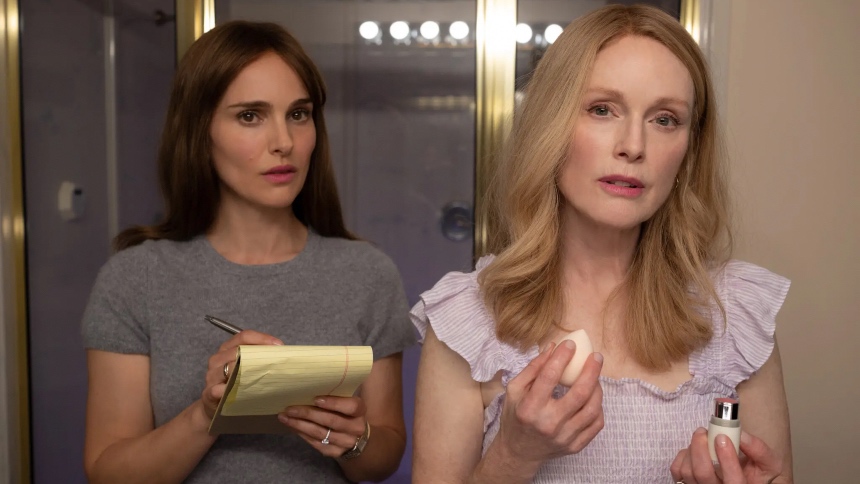Cannes 2023 Review: MAY DECEMBER, Delicious Ides
Natalie Portman and Julianne Moore star in a new film by Todd Haynes.

From the outset of his career, Todd Haynes has delighted in a sort of true melodrama, offering thoughtful expressionism to some of the century’s biggest suburban scandals and hush-hush subjects.
Whether he’s using stop-motion Barbie dolls to hyper-stylistically represent the real-life woes of Karen Carpenter, or a Sirkian palette to depict closet homosexuality in the American picket fence 50s of Far From Heaven, his language is tightly connected to the subject. So to hear of Haynes tackling a more contemporary tabloid topic, one that was active concurrent to his first decade as a filmmaker, is nothing short of an indie event.
If the plot of May December rings any bells, it's because you're already familiar with the real-life (true crime, I suppose) story of Mary Kay Letourneau, who at 36 years of age began a sexual relationship with one of her seventh-grade students, the then 12-year-old Vili Fualaau. How she could have made such a digression and then continued to play out the relationship after her prison term, going as far as to begin a family with three children, was a subject of jaw-dropping mystification during the 90s.
As a character, Mary Kay is beyond intriguing. That the story wasn’t fodder for more movie-of-the-week’s in a decade ripe with them is somewhat baffling considering ‘lethal-Lolita’ Amy Fischer had three within two years. Shall we chalk it up to ageism?
Meanwhile, as we know from Superstar: The Karen Carpenter Story, Todd Haynes’ breakout short based on the headline news item that a year later spawned a more traditional TV movie that was itself part subject of Superstar, Haynes is at least something of an appreciator of the tawdry genre.
Thus, to hear the premise of Haynes’ latest film, May December, longtime fans of Haynes’ modus operandi should be more than a little excited. The story of May December begins 23 years after the earth-shattering events that initially raised the question of, ‘What could this woman have been thinking?’ when a high-profile actress named Elizabeth Berry (Natalie Portman having fun with her own celebrity) visits town in an attempt to answer that very question for the purpose of a hopefully insightful, even revelatory, indie film.
At this point, former seventh-grader, Vili Fualaau, portrayed as Joe Yoo by Charles Melton, has reached 36 years of age, the same age as Mary Kay Fualaau, thinly veiled as Julianne Moore’s Gracie Atherton-Yoo, at the time when their relationship began. In the years since the notorious incident, the two have built a seemingly happy life in a small town with a son and twin girls on the cusp of college.
The more time that mega-star Elizabeth Berry, whose A-lister / top-tier-model status echoes Natalie Portman’s own staggering success, can spend with the happy family, the less likely that the film she intends to make will veer into exploitation territory. But Berry, played with a self-reflexive wink by Portman, is so disruptively famous that when she walks into a room she becomes the entire focal point of anyone in her vicinity.
So you can imagine the extent to which her visit rocks Savanna’s small-town vibes when Elizabeth begins studying the family for the purposes of portraying her with as much truth as she's able to muster from the reticent tabloid legend. Unfortunately, the dubious Gracie is more than a little reluctant to participate in Berry’s allegedly noble goal of honoring her humanity in all its complexity.
Why Elizabeth Berry is so confident that she's the person for the job of bringing truth to these past public events is not immediately apparent, but in a deliciously honest lecture to Gracie’s daughter’s drama class, she explains with scintillating honesty what would attract an actor to a character/person as mysterious as Gracie.
Given the public exploits of the family's origin story, popular preconceived notions would suggest that most people, especially a star as renowned as Berry, would feel comfortable assuming the moral high ground in the situation, but Elizabeth is herself far more complicated than we first assume her to be, and her presence shakes the boundaries of appropriateness, particularly as she becomes increasingly suggestible with her interpretation of the grown-up Joe, who is the same age as Berry.
In the film’s intense Persona-esque duel for character authorship, Joe is an innocent caught between two strong female personalities. And while it's tempting to assume that he may be some kind of Stockholm syndrome victim, that Joe so clearly loves his kids and nobly attempts to be the best father and husband he can be, suggests otherwise. In a film dominated by two powerhouse performances from its female leads, actor Charles Melton does a beautifully subtle job of bringing a wholesome upstandingness to the character and is thus responsible for some of the film's most heart-wrenching moments.
Otherwise, the film's tone is comically thrilling, with a score so satirically intense that Haynes joked at the Cannes press conference that the film can't possibly live up to it. This is because the dread is the point, and what these characters are thinking at any given moment is anyone's guess.
Framed almost as a detective story with Elizabeth attempting to peel the onion, the real onion of this film isn't what's ticking beneath the surface of Gracie’s personal motivations, but how the trio’s multi-faceted behaviors will clash, crash, and potentially burn. The result could make all the difference in the world between a potential indie character-driven masterwork, or just another tabloid movie-of-the-week.
With an incredible script from first-time screenwriter Samy Burch, deliciously knowing direction with densely intricate Ingmar Bergman-esque framing and performances of the highest caliber, Todd Haynes has not only indeed built a character-driven masterwork, but one of the finest of his fascinating career.
The film debuted at Cannes. North American distribution rights have now been acquired by Netflix.







